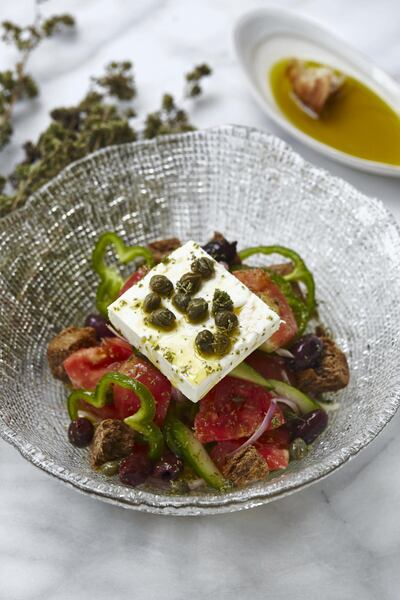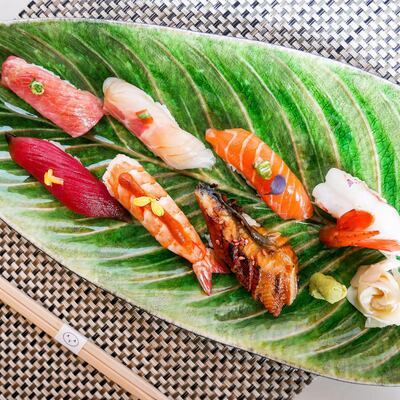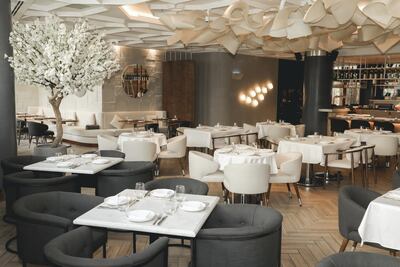Nigeria-born, London-raised Izu Ani is often referred to as “Dubai’s chef”, thanks to the number of projects he always seems to have on hand. Just last month, for example, Ani added not one but two new restaurants, Fika in Jumeirah Beach Hotel and Aya in City Walk, to his portfolio. Both have since been patronised by Sheikh Hamdan bin Mohammed, Crown Prince of Dubai, who’s also been spotted at Ani’s DIFC restaurant Gaia and Emirates Golf Club eatery Carine (named after Ani’s wife).
The ever-candid Ani, who also heads Izu Brasserie & Bakery and The Lighthouse, admits that launching two restaurants almost simultaneously wasn't exactly the plan. Rather, it's a consequence of working in an industry often fraught with delays. How does he handle it? "With a stress level of 10, between one and 10," the chef says with a laugh, adding: "But you trust in your team ... and take it positively. Every challenge is an opportunity to find out how good you are."
Ani burst on to Dubai's culinary scene as the head chef of La Petite Maison then moved on to La Serre Bistro & Boulangerie. When he decided to set up his own restaurants, he wanted each to have a distinct personality – from Asian Aya and Greek Gaia to French-Mediterranean Carine. This was a decision Ani – who says he "loathes mediocrity" – made to get out of his comfort zone.
“With every restaurant, I put myself in a different situation,” says the chef. “It allows me to adapt, to make myself relevant. It’s my way of discovering who I am. If you do the same thing over and over again, why does a person come and need to try it a second time? I believe that each concept needs to have its own identity. It really isn’t about me; I’m just in the background.”
Aya, for example, which is the chef's foray into Asian food, has a distinctive menu that gives traditional fare an international twist. In a city with no dearth of Asian restaurants, Ani promises Aya will bring something entirely new to the table. The space includes elements of a Japanese garden complete with a cherry blossom tree. Diners can expect dishes such as kunafa-wrapped prawns and a Wagyu katsu sando with Hokkaido milk bread. "Asia is so huge; it gives me a big playground to experiment. That's why I'm so excited to be working with this concept," he says.
Meanwhile, at Fika, the focus is on wholesome yet indulgent cuisine, in that fresh produce and nourishing ingredients are cooked fine-dining-style. Think of a salad with blueberries and feta cheese or lobster roasted with charcoal.
In Dubai's cut-throat F&B industry, with restaurants regularly shutting down, opening one seems challenging. Opening six? Downright ludicrous. But Ani has utmost faith in the food scene. "You so often hear people complaining about how competitive the industry here is, but the truth is that's Dubai's way of saying: 'If you're not good enough, you shouldn't be here.' [Diners] deserves the best, and for that, you need to be fighting for the number-one spot."
So what does it take to run a successful restaurant in this city? Ani, who worked in France and Spain before relocating to the UAE, puts it down to a number of factors: an understanding of ingredients (the chef is not above talking to his tomatoes and olives), an unwillingness to cut corners and a desire to give back to the city that is home for him. “Dubai energises me,” says Ani. “It’s a place that challenges … but you come out stronger for it. A lot of people have a transient idea about it, but I always wanted to buy a house and live here.”
With classic ideas about what makes a restaurant stand out, Ani does not believe in following trends, which he says, can lead to an eatery becoming "old news" very fast. In an industry often dominated by social media, where chefs are pushed to create dishes that are more for Instagram, this can be seen as unorthodox. But the chef believes restaurateurs should stand their ground against what is often social media bullying.
"When someone is saying they are impartial, but they also have their hands in the proverbial cookie jar, that makes no sense to me," Ani says on the subject of overnight influencers versus trained food critics. "You have a lot of self-proclaimed critics, but food is subjective. Instead of just saying 'this is great and this is not', give me a proper take on what's wrong. How can I fix it?"





